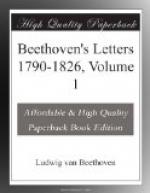Even before I rise, my thoughts throng to you, my immortal beloved!—sometimes full of joy, and yet again sad, waiting to see whether Fate will hear us. I must live either wholly with you, or not at all. Indeed I have resolved to wander far from you [see No. 13] till the moment arrives when I can fly into your arms, and feel that they are my home, and send forth my soul in unison with yours into the realm of spirits. Alas! it must be so! You will take courage, for you know my fidelity. Never can another possess my heart—never, never! Oh, heavens! Why must I fly from her I so fondly love? and yet my existence in W. was as miserable as here. Your love made me the most happy and yet the most unhappy of men. At my age, life requires a uniform equality; can this be found in our mutual relations? My angel! I have this moment heard that the post goes every day, so I must conclude, that you may get this letter the sooner. Be calm! for we can only attain our object of living together by the calm contemplation of our existence. Continue to love me. Yesterday, to-day, what longings for you, what tears for you! for you! for you! my life! my all! Farewell! Oh! love me forever, and never doubt the faithful heart of your lover, L.
Ever thine.
Ever mine.
Ever each other’s.
[Footnote 1: These letters to his “immortal beloved,” to whom the C sharp minor Sonata is dedicated, appear here for the first time in their integrity, in accordance with the originals written in pencil on fine notepaper, and given in Schindler’s Beethoven’s Nachlass. There has been much discussion about the date. It is certified, in the first place, in the church register which Alex. Thayer saw in Vienna, that Giulietta was married to Count Gallenberg in 1801; and in the next place, the 6th of July falls on a Monday in 1800. The other reasons which induce me decidedly to fix this latter year as the date of the letter, I mean to give at full length in the second volume of Beethoven’s Biography. I may also state that Beethoven was at baths in Hungary at that time. Whether the K—— in the second letter means Komorn, I cannot tell.]
16.
TO MATTHISSON.
Vienna, August 4, 1800.
MOST ESTEEMED FRIEND,—
You will receive with this one of my compositions published some years since, and yet, to my shame, you probably have never heard of it. I cannot attempt to excuse myself, or to explain why I dedicated a work to you which came direct from my heart, but never acquainted you with its existence, unless indeed in this way, that at first I did not know where you lived, and partly also from diffidence, which led me to think I might have been premature in dedicating a work to you before ascertaining that you approved of it. Indeed, even now I send you “Adelaide” with a feeling of timidity. You know yourself what changes the lapse of some years brings forth in an artist who continues to make progress; the greater




